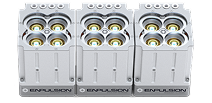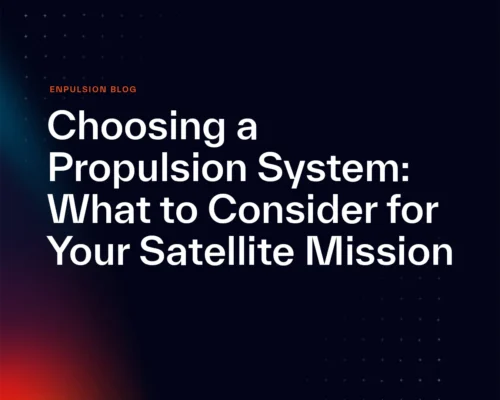Plug-and-Play Propulsion: Reducing Time to Market for SmallSat Missions
Plug-and-Play Propulsion Systems for Faster SmallSat Launches
NewSpace manufacturers, smallsat integrators, and procurement leads: are you feeling the pressure to launch your products faster? If not, consider yourself lucky. But for most of the industry, the pinch is real.
Traditional propulsion integration doesn’t make that problem go away — in fact, it amplifies it. You’re dealing with increased engineering complexity, more risk, and more overhead.
At Enpulsion, spacecraft integration has been at the core of product development since the beginning. Our plug-and-play FEEP system architecture is engineered to eliminate the typical roadblocks that delay builds. Here’s how.
Traditional propulsion complicates time to market
First, let’s revisit the requirements of traditional thruster systems, which usually involve handling hazardous materials like toxic propellants or high-pressure gases. As soon as these are introduced to a design, other requirements come into play, like specialized containment tanks and monitoring systems, to keep the design safe.
Integration itself is just as demanding. Complex electrical and software interfaces, custom wiring, bespoke control protocols, and extensive system checks create cross-department engineering that stretches timelines and complicates qualification.
Enpulsion’s FEEP propulsion systems remove complexities
Our Field Emission Electric Propulsion (FEEP) systems are engineered with a passive, modular architecture that uses solid indium metal as a propellant — a safe, non-toxic, and abundant option.
Indium is solid until it’s heated in orbit, and once liquified, it flows directly out of the tank and into the ion emitter. It doesn’t require pressurized tanks, valve networks, moving parts, or other complex integrations to route propellant through the system.
Each unit we build is pre-filled, fully qualified, and fully tested before delivery to reduce the need for on-site handling, integration, and testing. No special handling procedures or propellant loading. Installation is as simple as securing the propulsion system to your spacecraft and plugging in a cable — that’s true plug-and-play propulsion.
FEEP thrusters relieve engineering and procurement time pressures
While the science behind Enpulsion’s FEEP technology is sophisticated, the system itself is mechanically simple. There are no custom tanks or pressurization systems, so there are fewer design revisions, no launch-waiver engineering, and fewer cross-team dependencies to navigate.
Our production process is built on a foundation of serial manufacturing and standardized acceptance testing. This gives us the ability to design our propulsion systems in consistent batches, not as custom one-offs. Our streamlined manufacturing process also allows us to create, test, and ship each unit faster.
No backorders. No schedule uncertainty. No redesigns or revalidations.
Plug-and-play solutions for specific spacecraft
Our streamlined manufacturing process doesn’t limit our capabilities. Enpulsion has a solution for fast, frictionless integration for smaller and larger satellites.
The Nano Lark and Micro Starling are compact, all-in-one models that fit easily on CubeSats and microsats, respectively. There are no external tanks, valves, or pressurization, and they only require minimal interface work to get them up and running.
The Nexus Osprey offers the same plug-and-play approach, scaled for larger satellites without sacrificing simple mechanical and electrical integration. The higher thrust can support smallsat missions up to 500kg.
To see the full range of Enpulsion’s propulsion systems and find the best solution for your mission, check out our data sheets.
Elevate your next mission with plug-and-play propulsion
Faster time to market doesn’t matter if you can’t count on the product. Over 280 Enpulsion propulsion systems have been launched into orbit since 2018, accumulating over 420 combined years of on-orbit operations and an excellent track record, so there’s no compromising on speed and reliability.
Reach out to our team of experts to see how Enpulsion can power your next mission and make propulsion integration easier than ever.
Get the latest information on Enpulsion innovation.
Subscribe to stay up to date on Enpulsion news, technology updates, and industry events.





